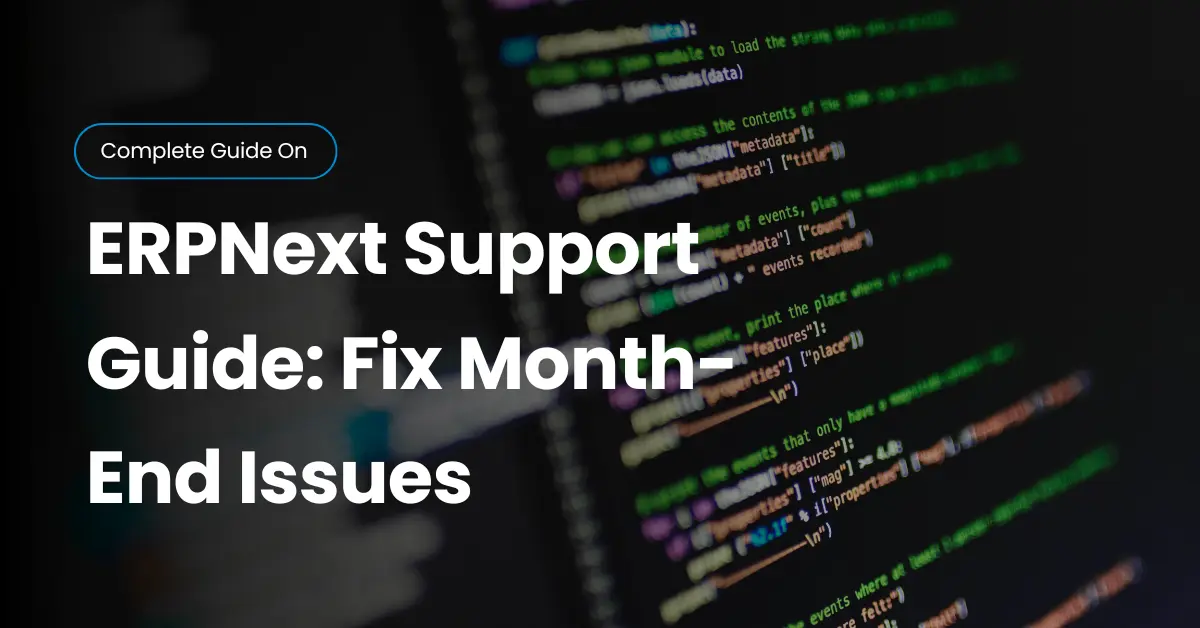Month-end is crunch time. Invoices, reconciliations, and financial closings pile up, and every click in ERPNext matters. Then suddenly—your system freezes, dashboards won’t load, or reports throw errors. It’s the kind of nightmare that leaves teams scrambling.
When that happens, reliable ERPNext Support is the lifeline. With the right steps, you can minimize ERPNext downtime, safeguard data, and get back on track before the pressure boils over.
Why ERPNext Breaks at Month-End
When everyone’s pushing reports, running reconciliations, and logging transactions, system strain increases. ERPNext performance often takes a hit under this heavy workload. The result? Slow screens, delays in posting entries, or worse, a full system crash.
It isn’t always load-related. ERPNext scripts or custom apps might misfire, patches could be outdated, or servers may lag. Without timely updates on latest ERPNext versions or optimization, these small issues stack up—leading to bigger failures during ERPNext month-end closing.
Immediate Steps to Take When ERPNext Suddenly Breaks
First things first—don’t panic. Quick, unplanned fixes often cause more ERPNext errors. Before touching a single setting, make an ERPNext backup. Even a corrupted copy is better than having nothing if the situation escalates.
Next, dig into the ERPNext logs and system notifications. Identify whether it’s a user-specific issue or a full-blown system-wide problem. This simple check prevents wasted time applying fixes to the wrong place.
Quick Checklist for First Response
- Pause and avoid rushed fixes.
- Run an immediate ERPNext backup.
- Review ERPNext logs for warnings or failures.
- Check if only certain users or modules are affected.
Quick Fixes You Can Try Before Calling ERPNext Support
Sometimes, the solution is simpler than it looks. Restart services with an ERPNext restart command (bench restart) to clear temporary issues. Also, check ERPNext database health—minor inconsistencies here can bring the whole system down.
If problems linger, try clearing the ERPNext cache and rebuilding assets. Review ERPNext scripts for errors too. For clarity, here are the most common quick fixes:
- Run
bench restart. - Validate ERPNext database health.
- Clear ERPNext cache and rebuild assets.
- Temporarily disable custom apps to isolate problems.
When You Should Seek Professional ERPNext Support
If downtime blocks critical ERPNext month-end closing, you need help fast. Temporary workarounds won’t protect financial data or reporting accuracy. This is where ERPNext professional help steps in to prevent costly mistakes.
Repeated ERPNext errors or recurring crashes are another red flag. If your internal team doesn’t have the technical depth, calling ERPNext Support saves both time and peace of mind.
Signs It’s Time to Call ERPNext Support
- ERPNext downtime disrupts accounting tasks.
- Data accuracy or integrity is at risk.
- Issues keep repeating despite quick fixes.
- Your team lacks ERPNext expertise.
How ERPNext Support Experts Help at Critical Times
Support teams don’t just patch problems. They dive deep into ERPNext troubleshooting with root cause analysis and database repair ERPNext strategies. That means less guessing and more permanent fixes.
They also optimize ERPNext performance for high-load times, applying preventive measures that safeguard your system. Instead of reacting every month-end, experts set you up for long-term ERP system reliability.
Common Expert Interventions
- ERPNext disaster recovery after crashes.
- Database recovery & performance tuning.
- Applying missing ERPNext patches or updates.
- Preventive fixes for recurring month-end failures.
Best Practices to Prevent ERPNext Month-End Failures
Prevention beats firefighting. Regular ERPNext audits, timely updates, and testing customizations in a staging environment reduce surprises. A little maintenance keeps ERPNext errors from snowballing into breakdowns.
The smartest move? Having an ERPNext Support plan in place. Here’s a quick comparison to show the difference:
| With ERPNext Support PlanWithout Support Plan | |
| Quick ERPNext troubleshooting | Delayed problem-solving |
| Preventive fixes applied | Recurring breakdowns |
| Proactive ERP maintenance | Reactive patching only |
| Guaranteed ERP support services | Uncertain outcomes |
Choosing the Right ERPNext Support Partner
Not all providers are the same. Look for an ERPNext partner with proven ERPNext case studies, fast response times, and deep technical knowledge. Cost matters, but ERP support services should be judged more by reliability and results than price tags.
Long-term contracts often deliver more value than one-off fixes. With an ongoing relationship, your provider understands your system and applies ERPNext preventive measures before problems arise. That’s real business continuity ERP.
What to Look For in a Support Partner
- 24/7 availability and quick ERPNext response time
- Proven ERPNext expertise across industries
- Transparent communication and reporting
- A history of strong ERPNext case studies
Frequently Asked Questions (FAQs):
1. Why does ERPNext often break during month-end closing?
ERPNext can slow down or crash during month-end because of high transaction loads, complex reporting, and unoptimized ERPNext scripts. Missing updates or patches can also trigger errors at critical times.
2. How do I quickly fix ERPNext downtime at month-end?
Start by taking an ERPNext backup, then check ERPNext logs for error clues. Try an ERPNext restart and clear cache. If issues persist, contact ERPNext Support for professional help.
3. When should I call ERPNext Support instead of fixing it myself?
If ERPNext downtime delays financial closings, risks data integrity, or problems keep repeating, it’s best to call for ERPNext professional help. This prevents bigger disruptions.
4. What are the most common ERPNext troubleshooting steps?
- Restart services (
bench restart) - Validate the ERPNext database
- Review custom scripts
- Apply missing ERPNext updates
- Clear ERPNext cache
5. How can I prevent ERPNext month-end issues in the future?
Schedule ERPNext audits, test customizations in a staging environment, and install updates on time. Having a proactive ERPNext Support plan also ensures long-term reliability.
6. How do I choose the right ERPNext Support partner?
Look for quick ERPNext response time, proven ERPNext expertise, and strong case studies. A trusted ERPNext partner should offer preventive maintenance, not just emergency fixes.
Conclusion
When your system breaks at the worst time—like during ERPNext month-end closing—it’s not just frustrating. It’s risky for data, deadlines, and peace of mind. The good news is, with the right ERPNext troubleshooting steps, you can limit damage.
Still, the smartest choice is being proactive. Reliable ERPNext Support ensures smoother closings, better uptime, and long-term stability. Don’t wait for another crunch-time crisis—partner with experts and secure your system before the next deadline.

